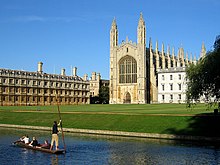
Back Кембриџь ауниверситет AB Universiteit van Cambridge AF ዩኒቨርስቲ ኦፍ ኬምብሪጅ AM Universidat de Cambridge AN कैम्ब्रिज विश्वविद्यालय ANP جامعة كامبريدج Arabic لجامعة د كامبريدج ARY جامعة كامبريدج ARZ কেমব্ৰিজ বিশ্ববিদ্যালয় AS Universidá de Cambridge AST
| Latin: Universitas Cantabrigiensis | |
| Motto | Hinc lucem et pocula sacra (Latin) |
|---|---|
Motto in English | Literal: From here, light and sacred draughts Non-literal: From this place, we gain enlightenment and precious knowledge |
| Type | Public research university |
| Established | c. 1209 |
| Endowment | £6.441 billion (including colleges) (as of 31 July 2018[update]) [3] |
| Budget | £1.965 billion (excluding colleges) [4] |
| Chancellor | David Sainsbury, Baron Sainsbury of Turville |
| Vice-Chancellor | Stephen Toope[5] |
Academic staff | 7,913[6] |
| Students | 19,955 (2016/17)[7] |
| Undergraduates | 12,340 (2016/17)[7] |
| Postgraduates | 7,610 (2016/17)[7] |
| Location | , |
| Campus | University town 288 hectares (710 acres)[8] |
| Colours | Cambridge Blue[9] |
| Affiliations | Russell Group European University Association G5 universities Golden triangle League of European Research Universities IARU |
| Website | cam |

The University of Cambridge (also called Cambridge University) is in Cambridge, England. It is the second-oldest university in all English-speaking countries. It is one of the world's leading places of learning.
The University started as a group of scholars in the city of Cambridge. This may have started in 1209 when scholars left Oxford after a fight with local people.[10] The universities of Oxford and Cambridge are often called Oxbridge. This is not a different university. It is a way of saying Oxford and Cambridge together. Cambridge University and Oxford University are both crucial to the history of England.
Cambridge is usually ranked in the world's top five universities.[11][12] UK rankings and tests on the quality of its research also rate it very highly. Cambridge has more than 18,000 students and many sports clubs and societies.
Many important people studied at the University of Cambridge, including scientists, poets, artists, politicians and members of the British Royal Family. 121 former students and staff from Cambridge later won a Nobel Prize.[13]
- ↑ "Accounts of the Colleges 2017-18" (PDF). Retrieved 11 June 2019.
- ↑ "REPORTS AND FINANCIAL STATEMENT 2018" (PDF). University of Cambridge. Retrieved 11 June 2019.
- ↑ Colleges £3,188.2M,[1] University (consolidated) £3,253.0M[2]
- ↑ "STATEMENTS OF COMPREHENSIVE INCOME FOR THE YEAR ENDED 31 JULY 2018". www.admin.cam.ac.uk.
- ↑ "New Vice-Chancellor for Cambridge". University of Cambridge. 2 October 2017. Retrieved 25 October 2017.
- ↑ 6.0 6.1 "Facts and Figures January 2018" (PDF). University of Cambridge. Archived from the original (PDF) on 2 April 2018. Retrieved 1 April 2018.
- ↑ 7.0 7.1 7.2 "2016/17 Students by HE provider, level, mode and domicile" (CSV). Higher Education Statistics Agency. Retrieved 25 March 2018.
- ↑ "Estate Data". Estate Management. University of Cambridge. 28 November 2016. Retrieved 1 April 2018.
- ↑ "Identity Guidelines – Colour" (PDF). University of Cambridge Office of External Affairs and Communications. Archived from the original (PDF) on 10 September 2008. Retrieved 28 March 2008.
- ↑ "A Brief History: Early records". University of Cambridge. Archived from the original on 11 September 2007. Retrieved 4 Sep 2007.
- ↑ Cite error: The named reference
ARWUwas used but no text was provided for refs named (see the help page). - ↑ Cite error: The named reference
QSwas used but no text was provided for refs named (see the help page). - ↑ Cite error: The named reference
Nobelwas used but no text was provided for refs named (see the help page).